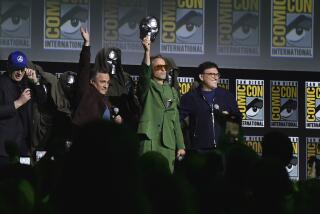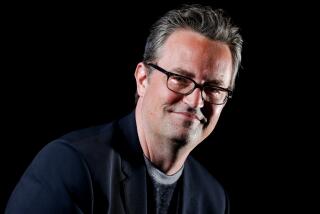Will Downey’s Difficulties Hurt His Career?
- Share via
Just days after his first arrest for heroin and cocaine possession, actor Robert Downey Jr. showed up on the set of his latest movie, “One Night Stand,” startling cast and crew.
He arrived on time, seemingly sober and with a professional demeanor to film his scenes as an AIDS-afflicted theater director in the movie directed by Mike Figgis (“Leaving Las Vegas”) and also starring Wesley Snipes and Nastassja Kinski.
For the record:
12:00 a.m. July 27, 1996 For the Record
Los Angeles Times Saturday July 27, 1996 Home Edition Calendar Part F Page 2 Entertainment Desk 1 inches; 20 words Type of Material: Correction
Omitted credit--Judy Brennan also contributed to an article in Friday’s Calendar about Robert Downey Jr. and Hollywood’s response to drugs.
For the Record
Los Angeles Times Thursday August 1, 1996 Home Edition Calendar Part F Page 5 Entertainment Desk 2 inches; 63 words Type of Material: Correction
Downey’s woes--The following quote--”There is too much young talent on the rise. Too much competition. Nobody wants someone that’s high maintenance and it can be a detriment at his age”--was incorrectly attributed to an unnamed agent from United Talent Agency in a story in Friday’s Calendar on the drug problems of actor Robert Downey Jr. The remark was made by a talent representative from another agency, also speaking on the condition of anonymity.
“His performance was completely mind-blowing,” director Figgis said. “He was on time and did amazing work. He was quite incredible, not only on the basis of considering that he was going through these problems, just on a very pure level.”
“All I can really tell you is he was 100% professional and a pleasure to work with,” said costume designer Laura Goldsmith, one of several crew members who had only praise for Downey’s work. “He was very charming, very friendly and very easy to work with. He made us lemonade while we did our fittings.”
But what if the beleaguered 31-year-old actor had not done such an exemplary job? Given his recent, very public brushes with the law--specifically three drug-related arrests in one month--if Downey had been even slightly unreliable or delivered a less-than-amazing performance, it might have spelled doom for his future as an actor.
The freewheeling ‘70s and ‘80s behind them, many inside Hollywood say the industry has taken a much harder line on hiring actors with drug problems, especially heroin.
“There is a new ambience that’s tough and hard and unyielding,” said Jack Valenti, president of the Motion Picture Assn. of America. “When the average cost of making and marketing a movie has gotten up to $54 million, the toleration level for drug-taking has gone to zero. For the first time, people are becoming pariahs on movie sets because of their drug habits. It looks like we’ve found a really first-class, efficient way to cut down on drug use among talented people: the refusal to hire them.”
It may not have quite reached zero tolerance yet, but filmmakers and studio executives agree that increasingly they are refusing to hire actors who they know have serious drug problems. Tom Pollock, former chairman of the MCA Motion Picture Group, for example, said while at Universal he refused to hire River Phoenix because he had heard stories of his drug use. Concerns about other hot young actors have surfaced and apparently affected their being hired.
“While we are not policemen, and have no obligation to go out and police people’s lives, I think we do have an absolute obligation when we know of a person who is an abuser not to do anything that would encourage that abuse, including hiring him,” Pollock said. “If there’s a drug or alcohol abuse situation, I think it’s the policy of studios not to hire them, if they know about it. It doesn’t help our society, it’s not good for business and it doesn’t help the abuser to be hired and given more money to continue it.”
*
Figgis pointed out Hollywood’s harder-line stance is not as simple as it seems. The professional ostracism can also exacerbate drug problems.
“Hollywood is sometimes a little hypocritical,” Figgis said, “and it makes it more difficult: If you get treated [like a pariah] then it’s harder to get work and perhaps that increases the addiction problem.”
Still, Figgis said, it is a double-edged sword for those, like Downey, who can maintain a level of professionalism while battling drugs.
“If you are of such a high-caliber talent, it can work for and against you,” Figgis said. “You can get away with things much longer which makes it much harder for you with your own problems, because you are being tolerated. On the other hand, once things come to a head and you are able to sort them out, it’s possibly easier to return to the fold.”
Downey’s agent, Ed Limato, said the industry will be watching closely to ensure that the actor deals with his drug problems before accepting him back into the fold.
“I told Robert, ‘I can’t go out and get you work now.’ Nobody is going to hire him until he straightens himself out,” Limato said.
A close friend of the actor’s said that although Downey has walked out of at least three rehabilitation centers over the past month, Downey wants to clean up his act. He said he spoke to Downey while he was in jail earlier this week and described the actor’s mood as “embarrassed and sad” over his recent actions.
“I don’t think that he’s suicidal,” the friend said. “He’s never been violent. This has all happened by accident. I know he wants to go on with his life. It’s hard to sit by and watch someone go down in flames.”
Earlier this week, Figgis wrote a letter to the court on Downey’s behalf asserting that the actor is “very serious and dedicated . . . and is not a threat to anyone but himself.”
“That was a personal gesture,” Figgis said. “I just want to help. I wanted to make a public statement if it possibly could help him towards some kind of rehabilitation. It’s difficult to know what to do to help.”
Downey’s troubles began June 23 when he was stopped for speeding and arrested on suspicion of driving under the influence and possession of Mexican tar heroin, cocaine and an unloaded gun. On July 16, he was arrested on suspicion of trespassing and charged with being under the influence of a controlled substance (believed by police to be heroin) after a Malibu resident and neighbor of Downey’s called police to report a strange man had passed out in her child’s bedroom.
The condition of his bail for that arrest was that he enroll himself in a drug treatment program, which Downey did. But he was arrested again Saturday when he slipped out a window of the Exodus Recovery Center in Marina del Rey. Since then he has been in Men’s Central Jail and appeared in court Thursday. A Malibu judge ordered Downey to remain in jail until Monday, when he will review a motion to release him to a lock-down drug rehabilitation center, where he would be supervised at all times for the first 30 days, said his attorney, Charles English.
“If he’s released to that program Monday, the judge will require that Robert agree that if he runs, he would set no bail,” said English. His preliminary hearing is set for Wednesday. The courtroom was packed with family members and friends--including actor Dennis Quaid--on hand to show their support for Downey.
Figgis said he believes Downey “will sort himself out” and that Hollywood will welcome him back.
But others aren’t so sure.
*
Although many industry insiders said they care for Downey as an individual and lauded his talent, some said they felt his latest behavior spelled doom for his future.
“Two drug arrests in a row? Yes, this can seriously damage your future in this town,” said an agent at United Talent Agency, which used to represent Downey. “There is too much young talent on the rise. Too much competition. Nobody wants someone that’s high maintenance and it can be a detriment at his age.”
Directors and others say they frequently discuss among themselves who is sober and who is not. But most in the industry say they cannot take any more drastic measures other than not hiring them for a movie.
“Most of us talk to each other and ask, ‘Is this person straight?’ ” said director Peter Hyams (“Sudden Death,” “Timecop”). When the word gets around that somebody is unstable, you stay away because you just can’t afford to have your picture screwed up. If a director hears someone is an addict, he would have to be suicidal to work with that. Maybe if it was a phenomenal star, but I don’t know of any giant star who has that reputation.”
“When filming costs $500,000 a day, you can’t afford to lose a day, a half day or two hours over that nonsense,” said Pollock.
As the costs of making movies have risen, the policy of insuring actors who star in movies has become increasingly commonplace. Those with any serious illness--including drug addiction--will not be eligible for insurance, say studio executives. If an actor or director exhibits a serious medical problem, the film can risk losing insurance and investors may back out. “It’s not a pro forma exam, a physician tests you,” Hyams said. “There are EKGs, blood tests. If a person is taking a lot of sick days, the studio will have to start eating a lot of money in overages and that’s not the kind of thing that’s going to be kept secret. And the next time that person is doing a film it’s going to be difficult for the person to get insured. This is such an incestuous industry. Somebody sneezes at Warner Bros. and somebody at Fox says, ‘Gesundheit!’ ”
Officials at New Line Cinema, the studio making “One Night Stand,” refused to comment about whether or not the actor had had to undergo a physical examination and drug test. Downey was on set for about two weeks.
Still, despite its current hard-line stance, Hollywood can also be pretty forgiving, say industry insiders, particularly in the case of the young and talented.
“He’s going to have to prove, really prove that he’s sober by completing drug rehab,” Limato said.
Said Figgis: “The industry may be tough and hypocritical but, at the end of the day, there is a warmth about it enough to forgive its own peers and help them.”
More to Read
The biggest entertainment stories
Get our big stories about Hollywood, film, television, music, arts, culture and more right in your inbox as soon as they publish.
You may occasionally receive promotional content from the Los Angeles Times.










